As a pet parent, nothing is better than when your cat decides to curl up for a nap on your lap. Sometimes it can be slightly irritating when you need to get some work done, attempt to move your fur baby, and they look at you like you’ve not only offended them, but also the entire domestic cat species.
But it’s impossible to say no to their adorable noses and whiskers, so you let them stay. Have you ever wondered why so many of our feline family members become lap cats? We’ll tell you everything you need to know about why cats love to sit on you.
Reasons your cat loves to sit on you

Cats sit on you because they seek connection and attention
Despite their reputation for being aloof, most cats crave attention, especially from their favorite people. Cats get lonely when you’re not around and will beg for attention when you are. One way they do this is by sitting on your lap; it’s hard to ignore them when they’re right on top of you! They also come to you for connection and love. Usually, a kitty on the lap gets affection, so your cat may come to you when they want to be petted and feel loved.
Cats get on your lap because you’re warm
Whether it’s by the radiator or in a sunbeam, kitties love napping in warm spots. One of the coziest places in your home happens to be wherever you are because of the heat your body emits. This could be why your cat likes sitting with you. They may choose to sit on your lap because they want to soak up all your body heat. Luckily, it’s not a one-way street; your feline’s body heat and fur can help keep you warm, too. With your lap cat, you’ll both stay nice and cozy.
Cats sit on you because they trust you
Sitting on top of you is a cat’s ultimate sign of trust. Pets only sit in the laps of people they really feel safe with. This is especially true if they nap on you. Your cat is essentially saying they trust you to protect them from any predators while they’re catching some z’s. To build even more trust with your pet, make sure you’re not forcing them to sit on your lap, and you’re giving them the option to walk away when they want. By acknowledging their freedom and leaving your lap open to your kitty, you’re encouraging them to trust you even more.
Cats like the way you smell and sound
Your body is like a white-noise machine for cats. They find the noises human beings naturally make, like breathing and heartbeats, to be very soothing. It helps them relax into an easy slumber. Your cat may also be attracted to your unique scent. Smelling you may make your cat feel safer, making it easier for them to fall asleep. This can also explain why your animal always seems to love sleeping on your clothes, bed, and other possessions.
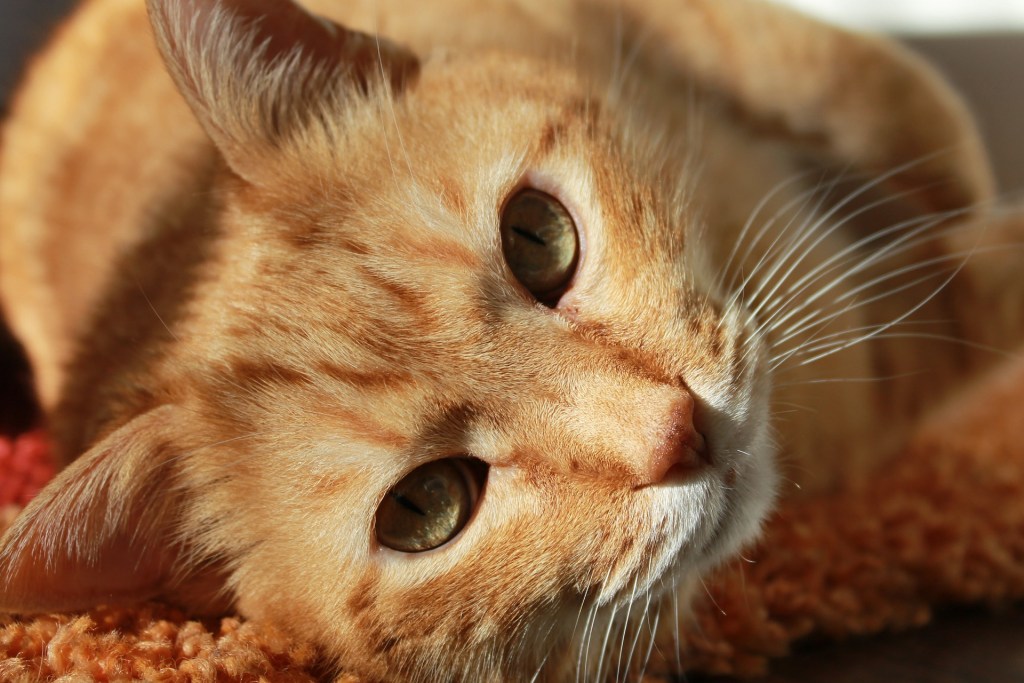
Your clothes feel nice to a cat
Have you noticed that your cat sleeps on your lap only when you’re wearing certain things? Cats love to nap in warm, comfy spots. They’re also sensitive to certain textures, favoring soft, fuzzy materials over scratchy ones. If you’re wearing a fluffy fleece sweatshirt or a soft bathrobe, your cat may be more likely to cozy up to you. But if you’re wearing a vinyl raincoat, they may not be as interested.
Of course, your cat likes you
In addition to trusting you and wanting your attention, a cat sitting on your lap usually means that they like you! Lots of cats choose a favorite human. Mousers have many ways of showing their affection, like purring, nudging you, and sitting in your lap. It’s high praise coming from a cat. They’re more likely to rest next to their favorite person than anyone else in the room.
Your cat is marking their territory
Many cats naturally feel the need to claim their territory, which might include you and your bed. Cats rub their heads and leave behind pheromones on whatever they feel is theirs. Then, when other cats come along, they can smell those pheromones and will recognize that they’re in another cat’s territory. By walking, lying, and rubbing himself on you and your bed, your furry friend may be marking his turf just in case another cat shows up and tries to claim you.
Which breeds are lap cats?
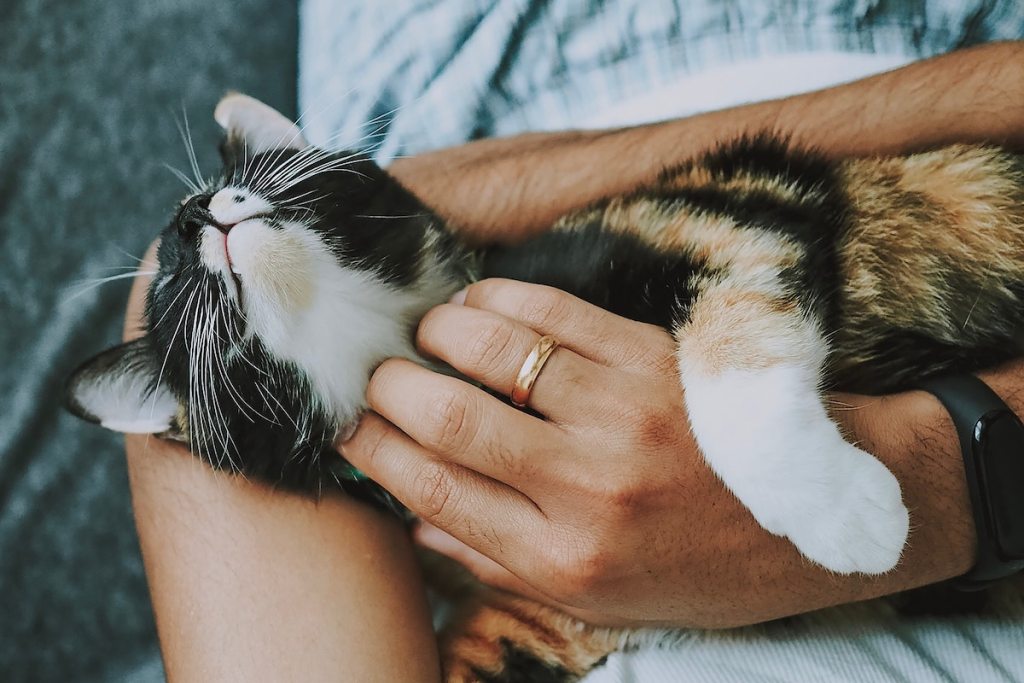
While any kitty could determine that he’s a lap cat, some are known for being more cuddly than others. Persians and Maine Coons especially enjoy a good snuggle with their favorite humans. These two also both rock really long and beautiful coats, making this an ideal opportunity to whip out the brush and give them a makeover.
On the flip side, the Siamese and the Bengal get a reputation for being a touch more standoffish and less likely to take you up on a proffered lap. Still, it really does all come down to personality — every cat has a different desired affection level.
Are boy or girl cats more affectionate?

Many owners swear that male cats rank as the cuddlier sex, reporting more snuggles and less aggressive behavior. However, the science isn’t really there. Studies have not found this correlation to hold, even though we perceive it to be the case. Gender and reproductive status do have an influence on some behavior, though.
Male cats who have not been neutered may be prone to roaming as they attempt to seek out a mate (some female cats do this, too). That would definitely make your kitty seem less snuggly. Certainly breed could hold some sway over their disposition, but even then, proper socialization, training, and environmental stressors play a bigger role. And, of course, all cats have their own unique personality!
Where your cat sleeps
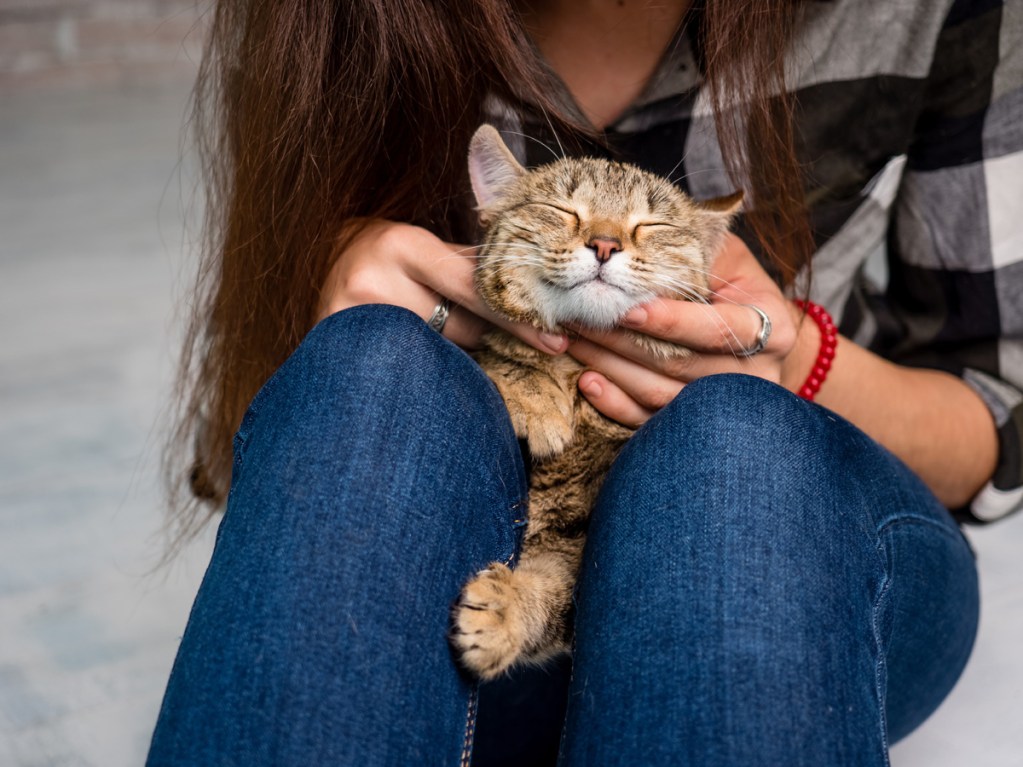
Your cat may sleep on different parts of your body for different reasons, too. Some cats delight in sleeping on their human’s head. This might be uncomfortable for you, but your cat might prefer it because your head doesn’t move often as you sleep. Your head also radiates heat, so your cat might curl himself up on your pillow to stay warm during the night.
Some cats prefer to doze on your chest. As you sleep, your slow and steady breathing could be appealing to them. Your chest also creates a broad, relatively flat area where your cat can soak up a lot of your body heat.
Understanding cat body language
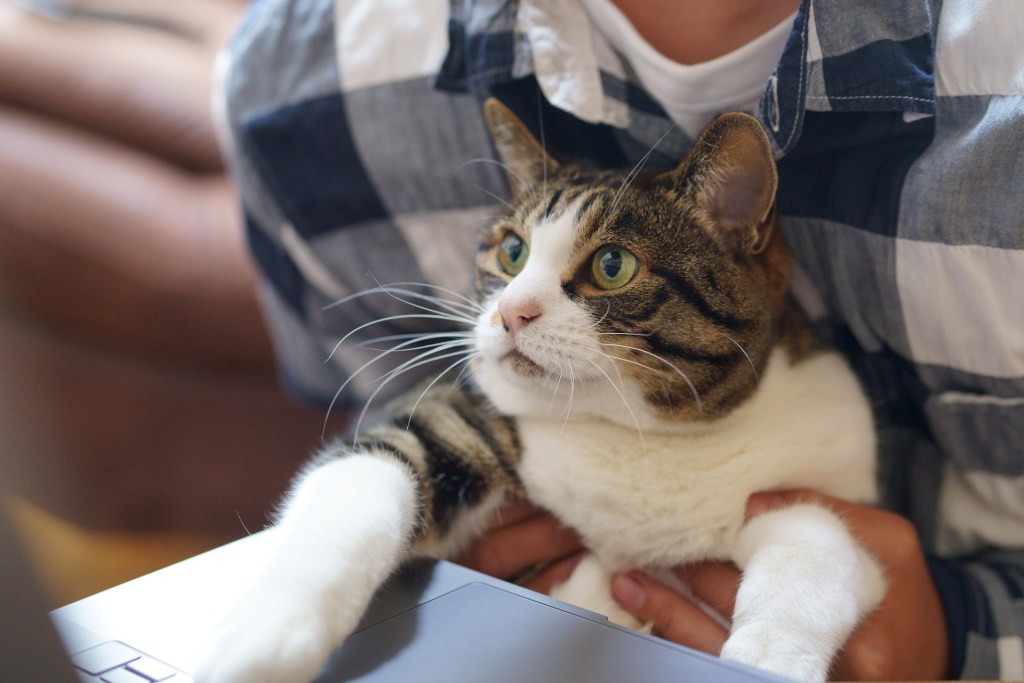
Looking at your cat’s body language can give you extra insight into what’s motivating them to join you to sleep. A fur baby that is relaxed, content, and happy to be snuggling up with you may exhibit various signs. They may stretch out on their back, exposing the belly — a vulnerable part of their body — and truly relaxing.
They may sleep with their legs extended out from their body instead of curled up tight. Your kitty may purr and look at you with squinted eyes, blinking slowly. They might even rub their head against you, marking you with their scents and claiming you as her own. In all these movements, they’re demonstrating that they’re happy and relaxed.
A cat that assumes a different posture might be seeking you out for security or warmth. In these cases, your cat is likely to be curled up tightly, protecting their belly. They may only half-close one or both eyes as they doze, leaving themselves alert enough to easily be fully awake in just seconds. Some cats may assume the “bread loaf” position, where they tuck their front legs under their bodies. In this pose, your cat can lightly snooze yet easily jump to their feet if they feel threatened.
Why some cats aren’t lap cats
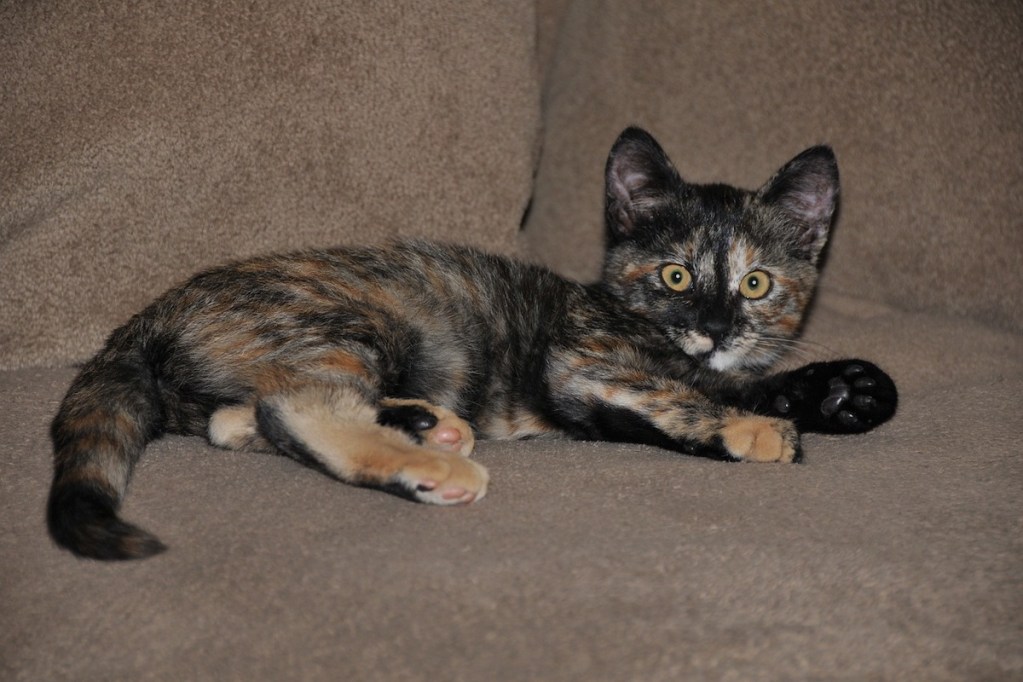
Sad but true: Not all cats enjoy snuggling with their human family members. Cats are communal creatures, but if they aren’t properly socialized as kittens, they may grow up to avoid contact as adults. If you adopted your cat as a grown up, it’s possible they came from an abusive household and formed negative associations with human contact.
Lastly, because cats are so territorial, your fur baby may shy away from sitting on your lap if you live in a multi-cat household. Because you smell like a rival, your cat might avoid your lap, thus steering clear of potential conflicts.
Your cat could be trying to tell you something’s wrong
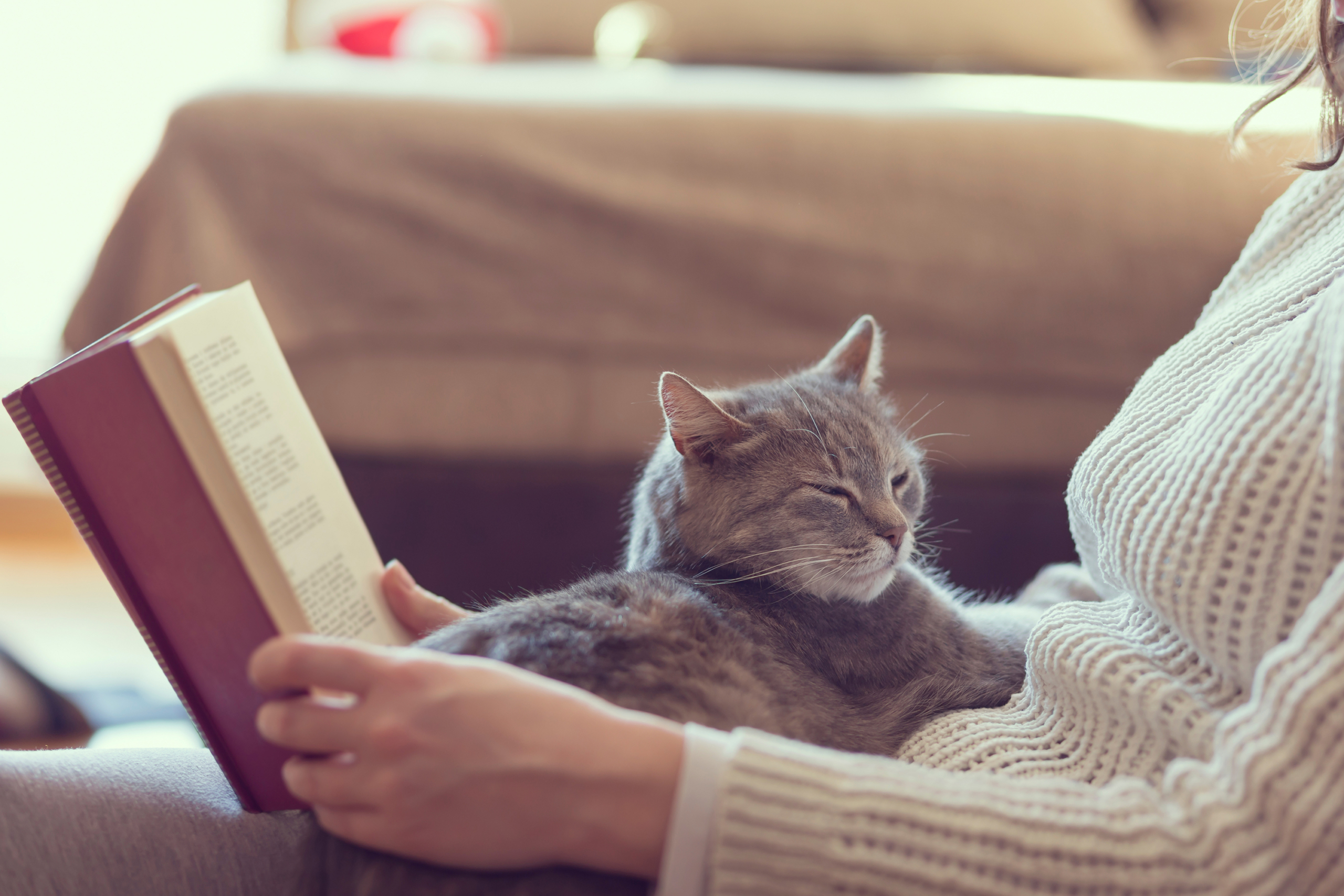
In most cases, your cat’s choosing to sleep on you is perfectly normal, especially if your cat makes a regular habit of it. A cat that frequently seeks you out for naps may just be highly attached to you or looking to deepen that bond. Every cat is different, so you’ll need to spend some time observing your cat’s preferences to get a sense of whether they like to regularly join you in bed at night.
Your cat’s sleeping habits can also alert you to potential health issues they may have. If your pet rarely sleeps with you yet suddenly starts resting on you constantly, it could indicate that they’re not feeling well. If this behavior is paired with your cat being unusually sedate or sleeping more than usual, then it’s important to schedule an appointment with your vet to have them checked out.
Your cat’s sleeping habits can vary with the seasons, with household changes like the addition of a new pet, and even with their moods. However, paying attention to your cat’s sleeping habits over time can help you stay aware of how they’re feeling and might warn you when a health issue is starting.




